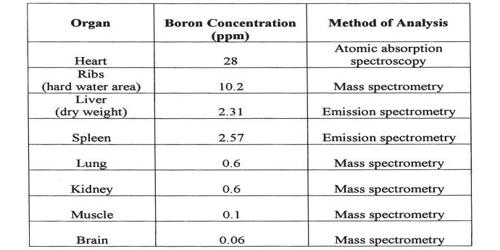Boron is a mineral that is found in food such as nuts and the environment. People take boron supplements as medicine. Boron deficiency is a pathology that may occur in animals due to a lack of boron. Boron helps your body metabolize key vitamins and minerals, has a key role in bone health, and it also affects estrogen and testosterone levels. A report was given by E. Wayne Johnson et al. at the 2005 Alan D. Leman Swine Conference suggests that boron deficiency produces osteochondrosis in swine that is correctable by the addition of 50 ppm of boron to the diet. The tolerable daily intake (TDI) set by the World Health Organization (WHO) is 0.16 mg/kg of body weight for humans.
Boron can aid in keeping your bones strong along with possibly improving brain function. It is known to play a role in extending the half-life of vitamin D and estrogen. First, vitamin D is essential for bone health because it enhances your body’s ability to absorb calcium. Boron could help enhance bone health by increasing how long vitamin D works in your body. This mineral is found in food and the environment and most individuals tend to take boron supplements as a form of medication.
Boron is used for boron deficiency, menstrual cramps, and vaginal yeast infections. Boron does not accumulate in most body tissues, but bone, nails, and hair have higher boron levels than other body tissues, whereas fat has lower levels. It is sometimes used for athletic performance, osteoarthritis, weak or brittle bones (osteoporosis), and other conditions, but there is no good scientific research to support these other uses. Boric acid is the main form of boron in blood, urine, and other body fluids. The lack of substantial changes in blood boron levels in response to large increases in dietary intakes suggests that the body maintains boron homeostasis, likely by increasing urinary excretion, but the regulatory mechanisms for boron homeostasis have not been identified. Boron is excreted mainly in the urine, and small amounts are excreted in the feces, sweat, breath, and bile.
Boron is an element found naturally in leafy green vegetables like kale and spinach. A person’s daily diet typically contains 1.5 to 3 milligrams (mg) of boron. In humans, boron deprivation (<0.3 mg/d) resulted in poorer performance on tasks of motor speed and dexterity, attention, and short-term memory. Boron was used as a food preservative between 1870 and 1920 and during World Wars I and II.
In plants –
Boron (B) is classified as an immobile element in plants. Boron is absorbed by plant roots and moved through the plant in the transpiration stream, and similar to calcium, active water movement through the plant is required to drive boron uptake. Because of boron’s involvement in cell growth, symptoms of boron deficiency are expressed at growing tips of the root or shoot, and generally include stunting and distortion of the growing tip that can lead to tip death, brittle foliage, and yellowing of lower leaf tips.
















